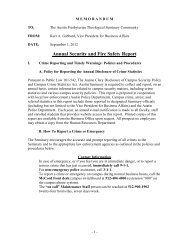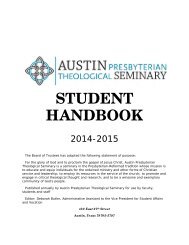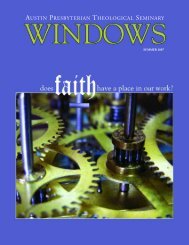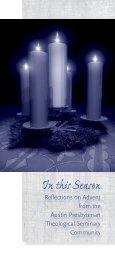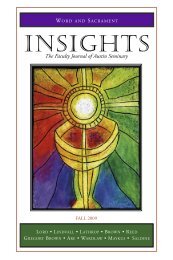Catalogue 2008 Book - Austin Presbyterian Theological Seminary
Catalogue 2008 Book - Austin Presbyterian Theological Seminary
Catalogue 2008 Book - Austin Presbyterian Theological Seminary
You also want an ePaper? Increase the reach of your titles
YUMPU automatically turns print PDFs into web optimized ePapers that Google loves.
DEPARTMENT OF THE CHURCH’S MINISTRY<br />
CM.126 INTRODUCTION TO PREACHING<br />
This course provides students a general introduction to the task of preaching. In it students<br />
will be asked to consider basic questions relative to the purpose of preaching and methods<br />
appropriate to that purpose. Further, students will examine the ordinary mode of preaching<br />
called a sermon to determine its essential characteristics. In addition, this introductory course<br />
will offer the opportunity for the participants to practice various skills requisite to responsible<br />
designing of sermons and effective oral communication. Six credits.<br />
Ms. Lord or Ms. Saldine; Spring<br />
CM.239 CHORAL MUSIC AND CORPORATE WORSHIP<br />
In this course, students sing and learn about a wide variety of music from the standard<br />
repertoire of the past, as well as some of the fi nest music of our own time. Students refl ect<br />
upon music as a part of worship, and evaluate its role in specifi c services. The goal is to<br />
increase participants’ understanding of the possible uses of music in worship and to broaden<br />
their knowledge of music resources. Regular participation in the <strong>Seminary</strong> choir is required.<br />
Students of varying vocal abilities are welcome. CM.239A concentrates on music from the<br />
Medieval period to the 18 th century. CM.239B concentrates on music from the 19 th century<br />
to the present day, including “world” music. Three credits. Mr. McClure<br />
CM.249 RESPONSORIAL PSALMODY<br />
This course explores the history and practice of responsorial psalmody. Six approaches are<br />
covered: Gregorian psalm tones, Lutheran <strong>Book</strong> of Worship, Anglican chant, Gelineau, Hal<br />
Hopson, and Haugen/Haas. Participants practice pointing the psalms in the various styles<br />
and conclude the course by serving as cantor in a chapel service. Three credits.<br />
Mr. McClure<br />
CM.251 HYMNODY<br />
This course provides students with a working knowledge of today’s eclectic repertoire of<br />
hymns. Acknowledging the vital role of historic expressions in congregational praise today,<br />
the fi rst part of the course is an intense historical survey, beginning with biblical hymns<br />
and extending through the hymnals of the latter nineteenth century. The course then deals<br />
with developments in contemporary hymnody, especially that of the last fi fteen years. Three<br />
credits. Mr. McClure<br />
CM.263 BAPTISM AND CHRISTIAN INITIATION<br />
This course examines the function of sacramental celebrations in shaping and expressing<br />
Christian faith and discipleship within the larger process of initiation in the life of the<br />
worshiping community. Following liturgical-historical study of the theology and practice of<br />
baptism, students examine the implications of recent reforms in sacramental theology and<br />
the practice of Christian initiation for the church’s mission today, including the role of the<br />
eucharist in initiation. The practical-theological study of baptism within Christian initiation<br />
includes scrutiny of contemporary baptismal rites and doctrinal statements of the churches,<br />
exploration of the liturgical space for baptism, and examination of liturgical roles in the<br />
celebration of baptism. A variety of learning approaches are used, including lecture, discussion,<br />
workshop exercises, and on-site study of liturgical environment and art. Prerequisite: CM.122<br />
or instructor’s permission. Six credits.<br />
CM.265 EUCHARIST AND THE CHURCH’S MINISTRY<br />
This course examines the function of sacramental celebrations in shaping and expressing<br />
Christian faith and discipleship against a background of shifting social, cultural, and political<br />
contexts. Following historical investigation of the theology and practice of eucharistic<br />
celebration, students examine the implications of recent reforms in sacramental theology and<br />
the practice of the eucharist, or Lord’s Supper, for the understanding of Sunday, the church, and<br />
the church’s ministry today, including attention to issues of evangelism and the role of baptism.<br />
Practical-theological refl ection includes the study of ecumenical statements, denominational<br />
standards, and liturgical rites within the context of a variety of learning approaches, such<br />
54



